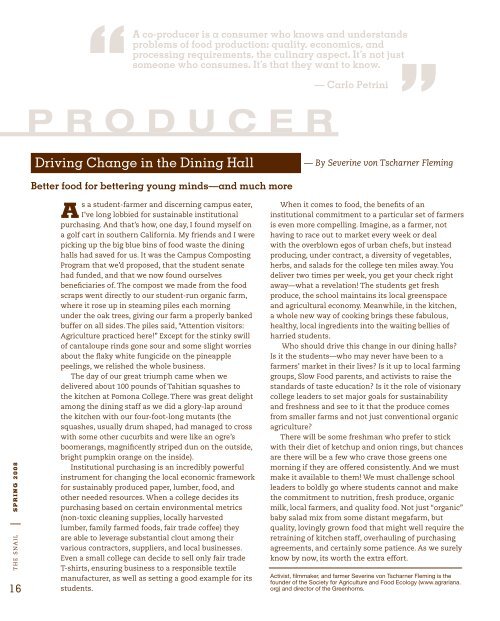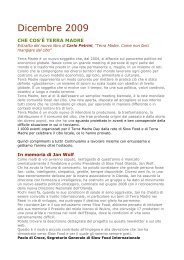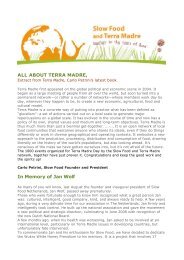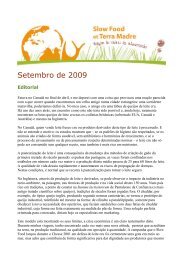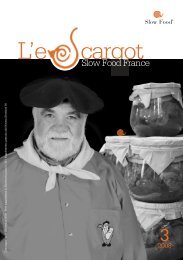all the food that's fit to print The Education Issue - Slow Food
all the food that's fit to print The Education Issue - Slow Food
all the food that's fit to print The Education Issue - Slow Food
Create successful ePaper yourself
Turn your PDF publications into a flip-book with our unique Google optimized e-Paper software.
A co-producer is a consumer who knows and understands<br />
problems of <strong>food</strong> production: quality, economics, and<br />
processing requirements, <strong>the</strong> culinary aspect. It’s not just<br />
someone who consumes. It’s that <strong>the</strong>y want <strong>to</strong> know.<br />
Producer<br />
— Carlo Petrini<br />
Driving Change in <strong>the</strong> Dining H<strong>all</strong><br />
— By Severine von Tscharner Fleming<br />
<strong>The</strong> snail | Spring 2008<br />
16<br />
Better <strong>food</strong> for bettering young minds—and much more<br />
As a student-farmer and discerning campus eater,<br />
I’ve long lobbied for sustainable institutional<br />
purchasing. And that’s how, one day, I found myself on<br />
a golf cart in sou<strong>the</strong>rn California. My friends and I were<br />
picking up <strong>the</strong> big blue bins of <strong>food</strong> waste <strong>the</strong> dining<br />
h<strong>all</strong>s had saved for us. It was <strong>the</strong> Campus Composting<br />
Program that we’d proposed, that <strong>the</strong> student senate<br />
had funded, and that we now found ourselves<br />
beneficiaries of. <strong>The</strong> compost we made from <strong>the</strong> <strong>food</strong><br />
scraps went directly <strong>to</strong> our student-run organic farm,<br />
where it rose up in steaming piles each morning<br />
under <strong>the</strong> oak trees, giving our farm a properly banked<br />
buffer on <strong>all</strong> sides. <strong>The</strong> piles said, “Attention visi<strong>to</strong>rs:<br />
Agriculture practiced here!” Except for <strong>the</strong> stinky swill<br />
of cantaloupe rinds gone sour and some slight worries<br />
about <strong>the</strong> flaky white fungicide on <strong>the</strong> pineapple<br />
peelings, we relished <strong>the</strong> whole business.<br />
<strong>The</strong> day of our great triumph came when we<br />
delivered about 100 pounds of Tahitian squashes <strong>to</strong><br />
<strong>the</strong> kitchen at Pomona College. <strong>The</strong>re was great delight<br />
among <strong>the</strong> dining staff as we did a glory-lap around<br />
<strong>the</strong> kitchen with our four-foot-long mutants (<strong>the</strong><br />
squashes, usu<strong>all</strong>y drum shaped, had managed <strong>to</strong> cross<br />
with some o<strong>the</strong>r cucurbits and were like an ogre’s<br />
boomerangs, magnificently striped dun on <strong>the</strong> outside,<br />
bright pumpkin orange on <strong>the</strong> inside).<br />
Institutional purchasing is an incredibly powerful<br />
instrument for changing <strong>the</strong> local economic framework<br />
for sustainably produced paper, lumber, <strong>food</strong>, and<br />
o<strong>the</strong>r needed resources. When a college decides its<br />
purchasing based on certain environmental metrics<br />
(non-<strong>to</strong>xic cleaning supplies, loc<strong>all</strong>y harvested<br />
lumber, family farmed <strong>food</strong>s, fair trade coffee) <strong>the</strong>y<br />
are able <strong>to</strong> leverage substantial clout among <strong>the</strong>ir<br />
various contrac<strong>to</strong>rs, suppliers, and local businesses.<br />
Even a sm<strong>all</strong> college can decide <strong>to</strong> sell only fair trade<br />
T-shirts, ensuring business <strong>to</strong> a responsible textile<br />
manufacturer, as well as setting a good example for its<br />
students.<br />
When it comes <strong>to</strong> <strong>food</strong>, <strong>the</strong> bene<strong>fit</strong>s of an<br />
institutional commitment <strong>to</strong> a particular set of farmers<br />
is even more compelling. Imagine, as a farmer, not<br />
having <strong>to</strong> race out <strong>to</strong> market every week or deal<br />
with <strong>the</strong> overblown egos of urban chefs, but instead<br />
producing, under contract, a diversity of vegetables,<br />
herbs, and salads for <strong>the</strong> college ten miles away. You<br />
deliver two times per week, you get your check right<br />
away—what a revelation! <strong>The</strong> students get fresh<br />
produce, <strong>the</strong> school maintains its local greenspace<br />
and agricultural economy. Meanwhile, in <strong>the</strong> kitchen,<br />
a whole new way of cooking brings <strong>the</strong>se fabulous,<br />
healthy, local ingredients in<strong>to</strong> <strong>the</strong> waiting bellies of<br />
harried students.<br />
Who should drive this change in our dining h<strong>all</strong>s?<br />
Is it <strong>the</strong> students—who may never have been <strong>to</strong> a<br />
farmers’ market in <strong>the</strong>ir lives? Is it up <strong>to</strong> local farming<br />
groups, <strong>Slow</strong> <strong>Food</strong> parents, and activists <strong>to</strong> raise <strong>the</strong><br />
standards of taste education? Is it <strong>the</strong> role of visionary<br />
college leaders <strong>to</strong> set major goals for sustainability<br />
and freshness and see <strong>to</strong> it that <strong>the</strong> produce comes<br />
from sm<strong>all</strong>er farms and not just conventional organic<br />
agriculture?<br />
<strong>The</strong>re will be some freshman who prefer <strong>to</strong> stick<br />
with <strong>the</strong>ir diet of ketchup and onion rings, but chances<br />
are <strong>the</strong>re will be a few who crave those greens one<br />
morning if <strong>the</strong>y are offered consistently. And we must<br />
make it available <strong>to</strong> <strong>the</strong>m! We must ch<strong>all</strong>enge school<br />
leaders <strong>to</strong> boldly go where students cannot and make<br />
<strong>the</strong> commitment <strong>to</strong> nutrition, fresh produce, organic<br />
milk, local farmers, and quality <strong>food</strong>. Not just “organic”<br />
baby salad mix from some distant megafarm, but<br />
quality, lovingly grown <strong>food</strong> that might well require <strong>the</strong><br />
retraining of kitchen staff, overhauling of purchasing<br />
agreements, and certainly some patience. As we surely<br />
know by now, its worth <strong>the</strong> extra effort.<br />
Activist, filmmaker, and farmer Severine von Tscharner Fleming is <strong>the</strong><br />
founder of <strong>the</strong> Society for Agriculture and <strong>Food</strong> Ecology (www.agrariana.<br />
org) and direc<strong>to</strong>r of <strong>the</strong> Greenhorns.


